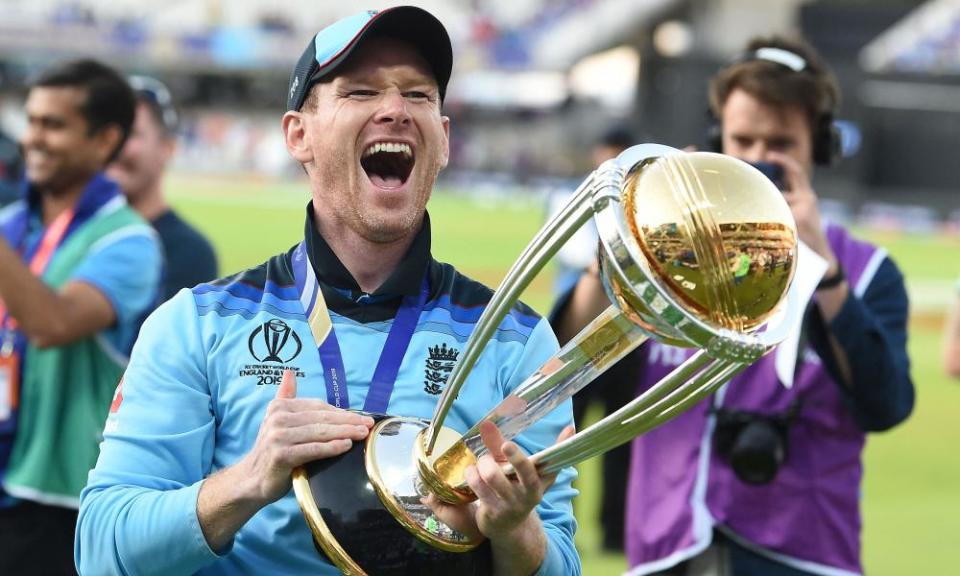‘The best we’ve ever had’: Eoin Morgan set to call time on England career

Eoin Morgan will return on Tuesday to the scene of the World Cup triumph he masterminded three years ago and call time on an England career that will go down in history as one of the most significant of the modern era.
As first revealed by the Guardian, the 35-year-old is poised to confirm his retirement from all forms of international cricket at a press conference at Lord’s on Tuesday afternoon after accepting defeat in his battle for form and fitness.
Morgan has long maintained he would stand aside if he felt he no longer merited his spot in the XI but after one half-century in his past 48 innings across international and domestic cricket – ending with two ducks in the Netherlands – the time is now.
A T20 World Cup in Australia later this year, on pitches which should suit England’s army of thunderbats, means Morgan has given his successor – most likely Jos Buttler – and the head coach, Matthew Mott, sufficient time to build their relationship. But the seven-year revolution is unlikely to end with his retirement.
Buttler will take charge of not just a team in Morgan’s image but a generation of cricketers all the way down the food chain who play in the style he dictated; should England go on to unite the T20 crown with the 50-over silverware Morgan lifted at the Home of Cricket on 14 July 2019, his legacy will only be further burnished.
“He obviously feels like he’s done with international cricket,” Moeen Ali, a linchpin of England’s white-ball teams under Morgan, told the BBC’s Test Match Special. “But the team for him still comes first, which just shows how unselfish he is. He’s done a remarkable job – the best we’ve ever had.
“It is and it isn’t [a surprise] at the same time. It is because of the T20 World Cup not being too far away and it’s strange to comprehend the side without him at the moment. Obviously things move on and you kind of get used to it, but it is sad.
Related: England chasing 296 to win third Test against New Zealand on day five – live!
“And I’m not surprised at the same time because he’s a very selfless person and he’s thinking about the team more than anything. We’ve been so strong over the years and he probably himself feels like his time is done and he’s given enough time for Jos or whoever the captain is going to be to embed his way.”
Morgan took charge on the eve of the 2015 World Cup but from the ashes of a group-stage exit transformed England’s fortunes. They won 16 of their 20 bilateral ODI series during the four years between World Cups, rose to No 1 in the rankings and broke the world record ODI total three times as players such as Buttler, Jonny Bairstow, Jason Roy and Ben Stokes made good on his attacking orders.
As well as compiling 13 ODI centuries for England himself after switching allegiance from Ireland in 2009, Morgan’s ice-cool demeanour in the field was central to captaincy and saw bowlers such as Adil Rashid flourish. He was also a champion of the team’s diversity, famously saying after the World Cup final that “Allah was with us” and they had “the rub of the green” – a nod to the array of backgrounds and cultures in the squad.
The T20 World cup final defeat against West Indies in 2016 was the one that got away, similarly the semi-final defeat by New Zealand last year. It remains to be seen if he will take up a role in England’s backroom staff but Morgan will continue playing domestic cricket including his role as captain of the London Spirit men’s team in the Hundred.
Speaking before the final day of the third Test at Headingley, the former England captain Nasser Hussain told Sky Sports: “Eoin has been the most influential white-ball cricketer England have ever had.
He’s been our best white-ball captain, and he has been a fantastic player.
“And he gave us the best moment in English white-ball cricket that we’ve ever had, at Lord’s. It was an incredible day, an incredible finale, and a lot of it was down to the skipper.”

 Yahoo Sport
Yahoo Sport 





































